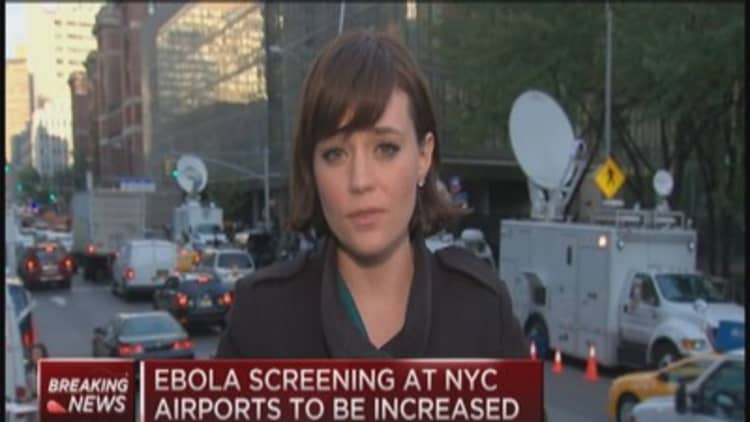
New York, New Jersey and Illinois announced plans to enhance screening procedures and quarantines for people traveling from countries impacted by Ebola, in a bid to arrest the domestic spread of the deadly virus.
On Saturday, Illinois Governor Pat Quinn unveiled a mandatory 21-day home quarantine for "high-risk individuals" who may have come into "direct contact" with infected patients in the three African Ebola hotspots of Liberia, Sierra Leone or Guinea. That represented a tightening of previous guidelines, which allowed for voluntary sequestering by travelers from those regions.
The move followed action taken on Friday by New York Gov. Andrew Cuomo, who teamed up with New Jersey Gov. Chris Christie to announce both states would increase current screening procedures in the wake of a NJ woman who was suspected of having the virus, but was declared negative early Saturday.
An update from the New Jersey Department of Health said the worker had tested negative in a preliminary test for Ebola, but would continue to be quarantined at University Hospital in Newark.
During a news conference with Cuomo Friday afternoon, Christie alluded to a health care worker with no symptoms of illness who had been treating Ebola patients in Africa, and whom he and Cuomo had decided should be quarantined on entry at Newark Airport.
The New Jersey governor stressed at the Friday news conference that "the stakes are just too high" to rely on self-quarantines.
Doctors Without Borders confirmed that the NJ woman was a member of their staff, though it was not clear in what capacity. A physician who worked with that aid agency, Craig Spencer, is now being treated for Ebola in New York City.
All medical workers from Ebola-affected countries will be subject to a quarantine, said Dr. Howard Zucker, acting commissioner of health for New York State. Cuomo said voluntary quarantine is not sufficient, and that it is "almost an oxymoron."
"In an region like this, you go out one, two, or three times—you ride the subway, you ride a bus—you could affect hundreds and hundreds of people," Cuomo added.
Health care workers who are working with Ebola patients in the U.S. may not be subject to the same restrictions, Zucker said.
"There is no reason for undo concern or undo anxiety under this situation," Cuomo said. "I believe this adjustment and increasing the screening procedures is necessary. I think it reduces the risk to New Yorkers and the residents of New Jersey."
The New York governor explained he and Christie believe it is a state's right to protect their borders, and he indicated that the governors have been in touch with the Centers for Disease Control and Prevention. He added he believed the CDC's procedures are "not rigorous enough."
Read MoreLatest on the Ebola case in New York
Christie said the measures are "necessary to protect public health. CDC's guidance is continually changing, and we need to set a standard for our two states," he added.
These new procedures have already been put in place at the Port Authority airports, Cuomo said.


